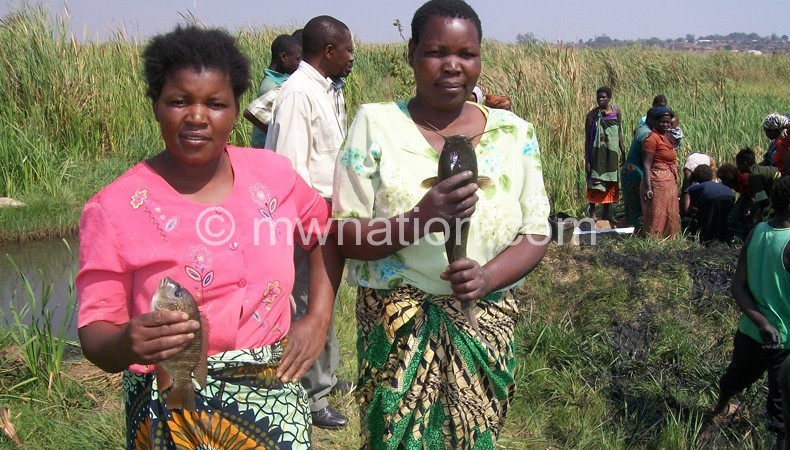Malawi women take fish farming to new heights
It is one of the most successful fish farming clubs in Mangochi, yet it has women at the helm, defying all gender and cultural stereotypes.
In a country where stories of sex for fish are popular along the lakeshores, making women appear as if they would rather sell their bodies to get this source of protein than touch the fishing rod, Joyce Patel and other women prove that women are capable of success in this male-dominated business.

Patel, who is secretary of Mlambe Fish Farming Club in Traditional Authority Katuli, Mangochi, has been with this women-led fish farming group since its establishment in 2012.
However, as Patel admits, the club’s success has not come on a silver platter.
“We have had to fight some cultural beliefs which are counterproductive to development. For example, in this area, culturally it is believed that although a woman may own land, we require the involvement of men to use the land productively,” says Patel.
Mirriam Milli, a member of the club, agrees with Patel, saying there is need for men and women to work together in development ventures.
“I call on fellow women to take an active role in fish farming as one way of addressing nutritional deficiencies at household level. Once a fish pond is constructed and proper management is applied, what follows are sweet returns of your sweat,” Milli says.
Mlambe Fish Club comprises 15 women and six men, and it has made remarkable strides by defying gender traditions in its quest to progress in the trade.
Senior Chief Chimwala, whose area follows matrilineal systems, says following the success of Mlambe Fish Club, it is high time some traditions are redefined to support the new development agenda.
“There is no way I can stop women from practising fish farming in my area. Lake Malombe is almost fishless now and it is women who suffer most when there is no food in the homes,” said Chimwala.
Mlambe Fish Farming Club justifies its choice of fish farming on daily challenges of finding appropriate relish.
“Our place is far from Lake Malawi or Malombe. As such, we used to buy poor quality fish that were not only a health risk, but expensive for most of us.
“But with our own ponds, we are assured of fresh fish supplies,” explains Patel, adding that the club intends to complement their business with vegetable production, capitalising on idle waters around the ponds.
Mlambe Fish Farming Club has a pond covering one-hectare and stocked with makumba and chilunguni. It was constructed with support from the Aquaculture Development Project in an effort to reduce poverty and achieve nutrition security through fish farming.
Kennedy Katikwiri, who is in-charge of Namwera Fisheries Satellite Station, hinted that with limited extension services, they are encouraging farmers to establish fish farming groups.
“While clubs are community owned, the intention is that they serve as a learning ground and later with support from government and non-governmental organisations (NGOs), each member of the group must graduate to start their own ponds,” Katikwiri says, adding this will ensure sustainability of the projects.
Mlambe Club has so far raised K360 000 in fish sales which, according to Patel, has been used to replace equipment, buy fish feeds and launch a village banking scheme whose profits are earmarked to fund construction of new nursery ponds.
Despite facing theft and inadequate feeds, Josia Chamveka, district fisheries officer for Mangochi, says plans are underway to train fish farmers groups in the district in theft control and feed formulation to maximise production.
Although Mangochi is regarded as a hub of fisheries in Malawi, Chamveka bemoans huge socio-economic and environmental pressures manifested by poor fish catches.
“The situation has changed now as less important species such as bonya have emerged to replace chambo, mcheni and other species that were more popular in the past,” he notes.
Chamveka says currently they have over 1 000 fish ponds, with potential for more.
Irrespective of cultural shortfalls, Chamveka expresses optimism of continued support from local NGOs and other government agencies to consider fish farming as part of rural food security and agricultural integration drive.
A total of 35 000 hectors of land in Malawi is said to be ideal for small-scale irrigation and aquaculture, according to the World Bank, presenting a unique entry-point for diversification of income generating activities.
Per capita fish consumption is currently pegged between four to seven kilogrammes, which is below the recommended World Health Organisation (WHO) individual consumption of 15 kilogrammes per year.
Although fish farming is a sure means of achieving household food security, costs of investments are making it difficult for many rural folks to embark it on full scale. Studies show that not less than K250 000 is required to construct a standard 200 square metres pond.
But the women of Mangochi are lucky to have the support of government and NGOs in their fish farming clubs.





